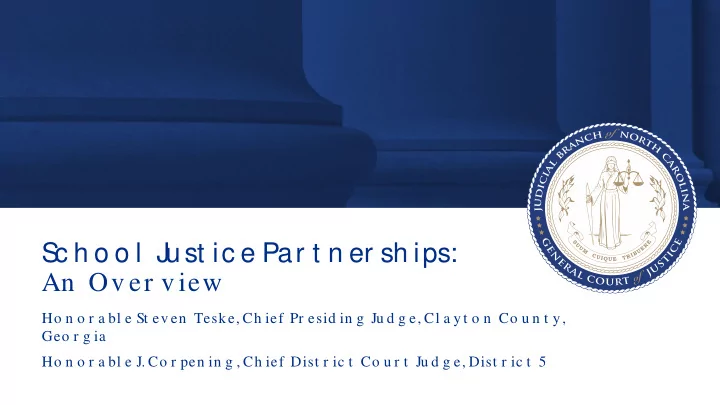

S c h o o l J ust ic e Par t n er sh ips: An Ov er v iew Ho n o r a bl e St ev en Teske, Ch ief Pr esid in g Ju d g e, Cl a yt o n Co u n t y, Geo r g ia Ho n o r a bl e J. Co r pen in g , Ch ief Dist r ic t Co u r t Ju d g e, Dist r ic t 5 1
IT’S ABOUT ME (FOR BOTH OF US) (SORT OF) 2
IT’S ABOUT RELATIONSHIPS (and the big picture) (with each other and with our students) 3
Takin g Car e o f Ch il d r en 4
Ch al l en g es o f In t er -Ag en c y Ac t io n 5
WHAT’S AT STAKE HERE? (where have we been and where are we going?) 6
Hist o r y o f t h e Pr o bl em Zero tolerance • Policy shifts: juvenile justice and education • Law enforcement in schools • Columbine • Societal trend toward litigation • Who is affected? • Suspensions? • Court involvement ? • 7
Impac t o f Br o ad Zer o To l er an c e Po l ic ies o n Sc h o o l Ca mpu s 1200 1000 800 600 School Offenses 400 200 0 1995 1996 1997 1998 1999 2000 2001 2002 2003 8
Wh y Is Th is Impo r t an t ? We’ve criminalized adolescent behavior Research on suspensions Phillippi’s comparison: one to court and one not Correlation to gang activity And yes, the school to prison pipeline 9
Ad o l esc en t Br ain Resear c h Frontal lobe of brain filters emotion into logical responses is not developed until age 25. Kids are neurologically wired to do stupid things! Kids are still under neurological construction. Kids are being hard-wired and need positive influences such as school. 10
S c h o o l Co n n ec t ed n ess School connectedness is a strong protective factor against delinquency . US Surgeon General. (2001). Youth Violence: A Report of the Surgeon General. School connectedness is linked to lower levels of substance abuse, violence, suicide attempts, pregnancy, & emotional distress . Journal of School Health 72 (4). OSS of elementary & middle school students contributes to drop-out rates . Predictors of Suspension & Negative School Outcomes: A Longitudinal Investigation (2003) 11
Wh y Is Th is Impo r t an t ? Research shows a strong link between court referrals and dropout rates Student arrested in high school is twice as likely to drop out Student who appears in court during high school is four times as likely to drop out Sweeten, Gary, Who Will Graduate? Disruption of High School Education by Arrest and Court Involvement. 24.4, Justice Quarterly, 462-480 (December 2006 12
Wh y is t h is impo r t an t TRAUMATIZED PEOPLE TRAUMATIZE PEOPLE 13
A S o l ut io n 14
NEW HANOVER COUNTY JOURNEY 15
KEY COMPONENTS CONVENER FACILITATOR THE TEAM FOCUS ACTS DISCIPLINE FACTORS GRADUATED RESPONSES AGREEMENT MONITORING 16
Th e Pur po se The purpose of the Interagency Agreement is to: Obtain agreement of all parties who respond to non-emergency school disruptions. Provide a consistent response to student misbehavior. Clarify the role of law enforcement in school disciplinary matters. Utilize alternative support services. Reduce involvement of law enforcement and court agencies for minor misconduct at school and school-related events. 17
Th e Ag r eemen t Utilize classroom, in-school, family and community strategies and maintain a positive climate within schools. Response to school disruptions should be reasonable, consistent and fair. Consider relevant factors such as age, nature of severity and impact on the learning environment. 18
Th e Ag r eemen t Hold students accountable for their actions. Graduate the response to minor misconduct to provide a continuum of services. Provide increasingly more severe sanctions for continued misbehavior. Use appropriate redirection and support for disruptive students. Use in-school and community resources prior to involvement of law enforcement. 19
Th e Ag r eemen t Clarify the responsibilities of school and law enforcement personnel with regard to non-emergency disruptive behavior promotes the best interests of the student, the school system, law enforcement and the community at large. Implement the partnership plan. 20
Pur po se To truly address behavior when and where it happens Instead of pushing the behavior out of school and never actually addressing it 21
Pur po se To return to an approach of discipline (to teach) as opposed to punishment 22
MINDSET SHIFT 23
TESKE: “WHO WOULD HAVE THOUGHT THAT KEEPING KIDS IN SCHOOL WOULD INCREASE GRADUATION RATES.” 24
QUESTIONS? 25
Th an k Yo u
Recommend
More recommend